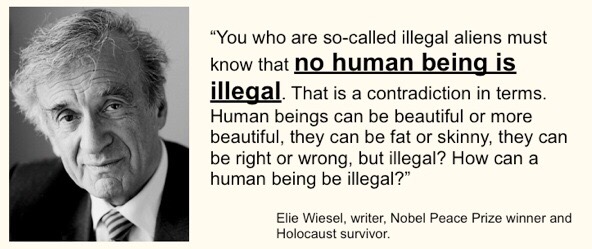What part of “illegal” don’t you understand?

Most African legal frameworks, have an immigration component, some were drafted from scratch while others were simply adopted from colonial regimes – a copy and paste if you will. Little has been developed jurisprudentially in this field. Mainly because, illegal immigration is not so prevalent. Political asylum notwithstanding, most folks are to a large extent economic migrants and there may be no point in migrating from Zimbabwe to Malawi for economic reasons when both are among the bottom 20 poorest countries in the World.
For those that manage to come to the US, this term “illegal” comes up way too often and I will not tire of reminding anyone Élie Wiesel’s immortal words, “No human being is illegal”. “My wife is illegal, how can I make her legal?” – “Ahem, say what now? Is she your 2nd wife [polygamy is illegal], is she cocaine? a banned substance? Ok then help me understand why you think she’s illegal?” “…. because her visitor visa expired 2 years ago therefore she is here illegally.” What follows in this article is what this person needed to know about the word “illegal” in relation to immigration status.
In immigration law, there is no such thing as an “illegal immigrant.” It’s simply not a category that exists. There are people who are deportable / removable (because they don’t have permission to be here, because they have permission to be here but have violated a term of their stay, or for some other reason such as a criminal conviction). There are people who lack legal status and are also not removable. There are people who “have no lawful status,” but are also not “unlawfully present.” There are people who are removable but also eligible to apply to stay in the US lawfully. There are people who would be eligible to apply to stay here lawfully, but the application is only available if the government first tries to deport them. There are people outside the US who are not eligible to come in legally, but if they were here, they would be allowed to stay. There are even people who are simultaneously deportable and eligible to apply for citizenship.
There are also ways to “break the law” and still be present lawfully. There are lots of types of violations of immigration law and criminal law that can’t result in deportation for people in certain types of status, or where there’s a “grace period.” There are some crimes where you’re fine if you were convicted in 1995, but totally out of luck if it was 1997.
When somebody comes to my office, it often takes me well over an hour of reviewing their paperwork and asking them questions about their entire life story and family history in order to figure out (a) whether they entered the US lawfully, (b) whether they are currently present in the US lawfully, (c) whether the government can lawfully deport them, (d) whether, if the government tries to deport them, they are eligible to apply to stay and how likely they would be to win, and (e) whether they’re eligible for benefits such as an employment based visa, a marriage-based green card, citizenship, asylum, visas for victims of crime or domestic violence, etc.
Sometimes we even find that somebody is a US citizen and didn’t even realize it — the US accidentally deports US citizens every year.
Every time Congress amends the Immigration and Nationality Act, they intensify our headache. Popular culture doesn’t reflect the complexity and subtlety of the laws, so understandably people want to classify folks’ status as “legal” or “illegal” when it’s usually just not so simple. I wish the laws were more straightforward and easier for people to follow.
So saying “illegal immigrant” is kind of like saying “an illegal movie.” There’s no such category, so what does it mean? Does the movie include illegal content such as child pornography and is therefore illegal to distribute? Did non-union actors work in violation of a labor agreement? Is the movie R rated but the theatre is allowing 5-year-olds in? Did somebody on the crew get a parking ticket on location? Was the DVD pirated or the script plagiarized? Does the movie depict lawlessness? Just saying “illegal movie” is nonsensical and doesn’t give you any information about the movie, whether I am allowed to watch it, or who would be responsible for what violations of which law.
“Undocumented” is a political term, not a legal one. People generally use it as a respectful term to refer collectively to people who entered without inspection and still have no status, and also those who entered lawfully but overstayed or violated their status. People often assume that only undocumented people can be deported, but actually people in lawful status can be deported too, including lawful permanent residents (“green card” holders). I have a client right now who has had his green card for 30 years, nothing unlawful about his immigration status, but he is in deportation proceedings following an illegal arrest by immigration officers, because of a criminal conviction from the early 1990s that he didn’t have to serve a day in jail for.
I sometimes use the general terms “out of status” or “lacking lawful immigration status.” This is roughly equivalent to how people use the term “undocumented” but it’s more precise because often people are “out of status” even though their entry to the US was totally legal and documented.
So… now what part of “illegal” don’t you understand?